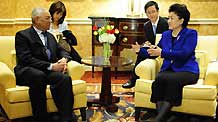China Proposes Greater Co-op with US in Education, Science, Technology
Adjust font size:
Visiting Chinese State Councilor Liu Yandong has put forward a series of proposals designed to further strengthen exchanges and cooperation between China and the United States in education, science and technology.
Liu, who arrived in Washington from New York on Monday to continue her official visit to the US, met separately in the past three days with Secretary of Education Arne Duncan, Secretary of Energy Steven Chu, Secretary of Agriculture Tom Vilsack as well as some other prominent figures in US education, science and technology.
During these meetings, Liu had an in-depth exchange of views with her hosts on how to further strengthen inter-exchanges and cooperation in the fields of education, science and technology between the two countries.
State Councilor Liu said that both China and the United States attach great importance to education, science and technology and have increased investment in these fields as a response to the ongoing global financial crisis.
Educational exchanges between China and the United States have been growing in a fast and robust manner ever since the two countries established diplomatic ties in 1979, she said. The two sides exchange students and teachers, sponsor various forums on higher education and cooperate in teaching and scientific research.
Liu hoped that the two sides could deepen cooperation in education by setting up regular exchange mechanisms, encouraging exchanges between universities or schools, exploring new mechanisms to increase exchange of students, enhancing faculty training, and promoting teaching of Chinese.
As to how to further strengthen bilateral cooperation in science and technology, Liu put forward the following proposals:
First, both sides should consolidate and improve bilateral mechanism on cooperation in science and technology and bring into full play the function of the Sino-US Joint Committee on Science and Technology Cooperation.
Second, both sides should strengthen effective cooperation in the fields of energy (clean energy and renewable energy in particular), climate change and environmental protection, agriculture, biology and pharmacy, engineering and basic scientific researches.
Third, with due protection of intellectual property rights, both sides should encourage joint research and development programs between universities, scientific institutions or corporations between the two countries.
Fourth, both sides should increase exchanges and cooperation between scientific institutions and scientists, especially young and middle-aged scientists, of the two countries.
During the meetings with Liu, the US hosts briefed Liu of American policies and priorities in education, investment on research and development, agricultural research, clean energy and reduction of greenhouse gas emission.
They expressed support in Liu's proposals to further strengthen bilateral exchanges and cooperation in education, science and technology, saying that the US side would improve and explore various mechanisms for this purpose and strive to elevate US-China cooperation in education, science and technology to a new level.
During her stay here, Liu also announced a series of programs designed to promote China-US exchanges and cooperation in education, including the establishment of scholarships to fund Chinese-teaching in the US, an invitation of 800 US college and middle school students to visit China this year, and a similar invitation to 800 presidents or principals of US elementary and middle schools.
(Xinhua News Agency April 18, 2009)
